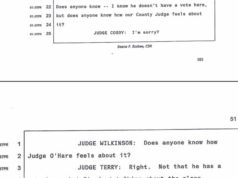Lock up the valuables. After ambling along for a couple of months, the Texas Legislature is entering the final, frenzied weeks of its biennial session. Major bills are going to go down in flames. Bad bills are going to pass almost unnoticed during the graveyard shift. Sneaky amendments will start popping up. Meanwhile, major issues such as eminent domain reform are hanging in the balance.
One of the better midnight moves came late Monday, when the House unanimously approved a measure that, if also passed by voters, would add strong limits on eminent domain to the state constitution. However, according to the Institute for Justice, a group that specializes in suing governments for using “eminent domain for private gain,” the House effort could still wind up in the legislative dustbin. That’s because the proposal now heads to the Senate – and into the tender care, most likely, of a committee chairman who has authored a much weaker bill along the same lines.
Static was thinking about that issue a few days ago when, out doing weekend chores, it drove past a handsome sign welcoming folks to Hurst, a “quality of life” city. Ironically, the sign sits at the edge of a shopping mall addition on Pipeline Road that a few years ago replaced a perfectly fine neighborhood. (No, Static was not shopping there.) Ten families were forced out by eminent domain, and dozens more left under the threat that their property would be taken, all so the city could hand the land to mall developers. A terminally ill woman was among the evictees.
Depending on what the lege and the voters do, Texans might actually be able to enjoy a little better quality of life in the future, knowing that the power of governments and their buddies – mall developers, pipeline companies, Trinity River Vision planners, out-of-control community college trustees – to take land from private citizens will be more restricted. Or … not. Don’t forget that Gov. Rick Perry vetoed a bill in 2007 that would have made it tougher to use eminent domain. Stay tuned.
ReDirkulous
When the Fort Worth Star-Telegram and the Dallas Morning News agreed to share content on sports coverage earlier this year, S-T Executive Editor Jim Witt said the two papers would still be “highly competitive” and vowed, “We won’t be trading things like investigative stories.”
Which brings us to the story about Dallas Mavericks’ star forward Dirk Nowitzki and his girlfriend with the eight aliases being arrested at his house last week on outstanding warrants involving check bouncing and other allegedly fraudulent behavior. It was the lead story on all the local news TV outlets and front page for both papers.
So who covered this highly competitive story for the S-T? That would be the News‘ team: investigative reporter Reese Dunklin, courts and police reporter Steve Thompson, and sportswriter Brad Townsend.
Under the content-sharing deal, the S-T covers the Texas Rangers, the News covers the Mavs and Dallas Stars, and the two papers swap things like game coverage. But this isn’t your run-of-the-mill sports story. It involved police and courts, outstanding arrest warrants from two states, and credit card fraud. The only sports angle was that Dirk was an employee of the Mavs.
Witt did not respond to an e-mail from the Weekly asking for his explanation of this increasingly cozy relationship. News Editor Bob Mong did respond, and he insisted it was a sports story and a good use of the shared-content arrangement.
Static fears that the door for newspaper content sharing will open wider and wider. Competition breeds hardworking journalists trying to get the real story; sharing content usually leads to complacency and comfy arrangements with news sources. But “highly competitive” stories often cost a lot of money to cover, and neither paper has much of that these days.











